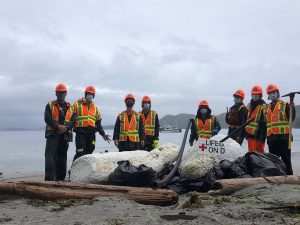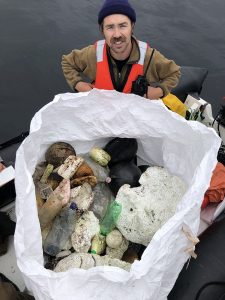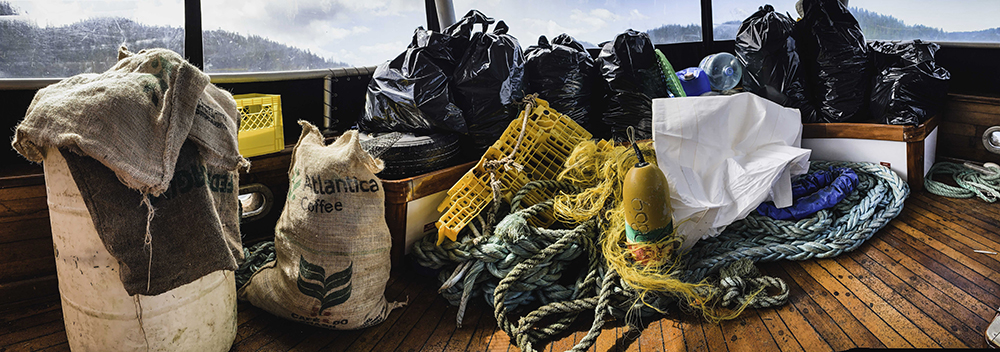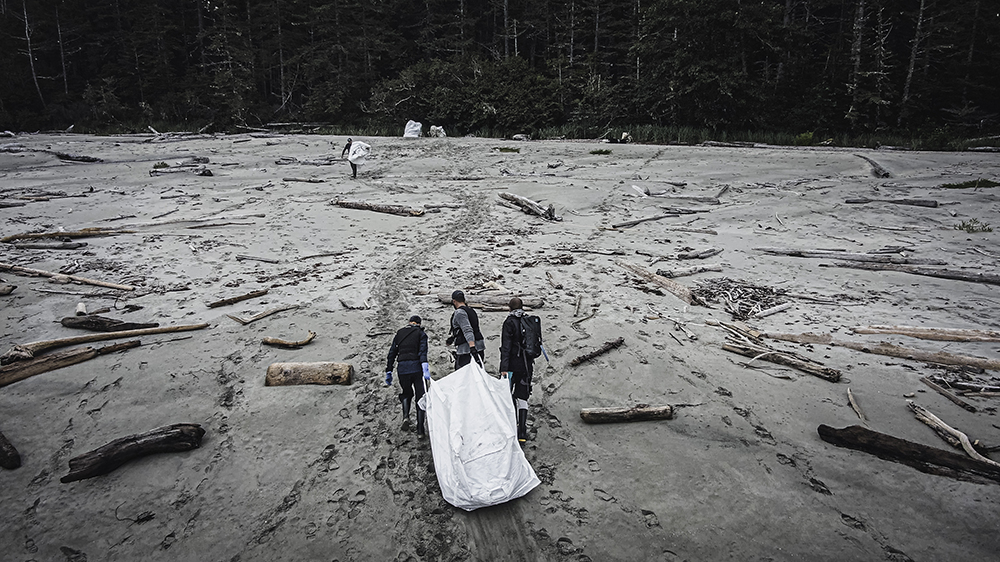On August 18, a fleet of tourism ships began an unprecedented, six-week expedition to the Great Bear Rainforest’s outer coast as part of the Marine Debris Removal Initiative (MDRI), a project funded by the provincial Ministry of Environment & Climate Change Strategy.
 With the blessing from Indigenous leaders in the region, the expedition expects to remove between 75 and 100 tons of marine waste, including plastics, from up to 1,000 km of coastal beaches along the Great Bear Rainforest. A group of BC small ship tour companies developed this innovative project in response to tourism shutdowns due to COVID-19.
With the blessing from Indigenous leaders in the region, the expedition expects to remove between 75 and 100 tons of marine waste, including plastics, from up to 1,000 km of coastal beaches along the Great Bear Rainforest. A group of BC small ship tour companies developed this innovative project in response to tourism shutdowns due to COVID-19.
Removing marine debris and plastics is a priority under the global Oceans Plastic Charter and the UN Sustainable Development Goals, to which Canada has committed. It’s a priority for Indigenous governments and communities, for sustaining ocean health and protecting community food harvest.
“In these trying and uncertain times, the proposal and initiative from the SSTOA provides a rare opportunity and a good news story,” says Doug Neasloss, Stewardship Director with the Kitasoo-Xai’Xais Nation. “Marine debris is an on-going challenge and a removal initiative of this scale -- to clean up a large, remote coastline -- is an undertaking that will provide significant environmental benefit to Kitasoo/Xai’Xais territory and beyond.”
The Great Bear Rainforest’s outer coast is strewn with reefs, and far from roads and communities, therefore clean-ups here are challenging. But the expedition tour companies have the skills and vessels to take on this rugged work, so, when COVID-19 shut down their season, the leaders decided to use their assets for the common good.
This initiative is being funded as part of the province’s COVID-19 stimulus funding and will provide needed work for 100+ crew and guides on nine ships, from five BC ecotourism companies. It will also employ a tug and barge and helicopter. In addition, a related in-shore clean-up done by members of Coastal First Nations communities will employ another 75 people.
“When it became clear we would not be able to operate under normal circumstances this summer and had to cancel a sold-out season, we turned our attention to the environment to give back to the coast that sustains us,” says Kevin Smith, CEO of Maple Leaf Adventures and co-lead on the project with Russell Markel of Outer Shores Expeditions. “We dreamed up an initiative for which there weren’t yet any dedicated resources. It’s been really rewarding to work with our colleagues on this, together as friends, not competitors. We also applaud the Wilderness Tourism Association, coast First Nations and the Province of BC for their support in helping clean up our oceans, a positive story for this unprecedented time.”
The crews, which include a number of scientists, are also collecting data on the debris they clean up, which they’ll provide to the Ministry of Environment & Climate Change Strategy.
“Cleaning up plastic and garbage from beaches has been identified as a priority for our Nation and is critical to the long-term health of the marine environment in our territory,” says Danielle Shaw, Chief Councillor for the Wuikinuxv Nation
 The project will be administered by the Wilderness Tourism Association of BC, of which the small ship tour companies are members. Their group, the Small Ship Tour Operators Association (SSTOA), is composed of seven 100% Canadian owned and operated, small-ship-based travel companies that specialize in providing niche wilderness travel experiences for groups of 6-24 guests along the British Columbia coastline. In particular, they operate in the Vancouver Island, Haida Gwaii, and Great Bear Rainforest regions. They have seen first-hand how marine debris can pile up on remote beaches only to be washed out into the ocean again during the next big storm, where they inevitably break down and become ocean microplastics.
The project will be administered by the Wilderness Tourism Association of BC, of which the small ship tour companies are members. Their group, the Small Ship Tour Operators Association (SSTOA), is composed of seven 100% Canadian owned and operated, small-ship-based travel companies that specialize in providing niche wilderness travel experiences for groups of 6-24 guests along the British Columbia coastline. In particular, they operate in the Vancouver Island, Haida Gwaii, and Great Bear Rainforest regions. They have seen first-hand how marine debris can pile up on remote beaches only to be washed out into the ocean again during the next big storm, where they inevitably break down and become ocean microplastics.
“B.C.’s coastal environment is one of our greatest assets, attracting visitors from all over the world and supporting tourism in British Columbia,” said Tourism, Arts and Culture Minister Lisa Beare. “Funding for these projects not only protects the marine environment, but provides jobs for people affected by the significant decrease in tourism as a result of the pandemic.”
Wilderness Tourism Association executive director, Scott Benton, will remain in Victoria to administer the MDRI expedition. Benton will also be supported by Katherine MacRae, Executive Director of the Commercial Bear Viewing Association, who has been instrumental in bringing this initiative to the government and the Tourism Industry Association of BC’s (TIABC) attention.
“Members of the SSTOA have pivoted to an innovative and reasonable idea that not only allows them to continue operating and employing skilled workers, but also provides a tremendous benefit to the province by cleaning up enormous amounts of harmful waste along the BC coastline that threatens marine wildlife, humans and the environment,” says TIABC’s CEO Walt Judas.

The leaders behind the MRDI include:
Kevin Smith – Owner, Maple Leaf Adventures, President, Wilderness Tourism Association. Captain Smith brings over 35 years of experience exploring the rugged BC coast, most recently 20 years as an eco-tourism businessman, captain and expedition leader. Previously as a geographer and park ranger, he worked with coastal communities on the Great Bear Rainforest land use agreement.
Russell Markel - Owner, Outer Shores Expeditions, Captain Markel holds a PhD in Marine Ecosystem Ecology and brings extensive experience leading and coordinating large interdisciplinary projects, including working closely with coastal First Nations.
Randy Burke – Owner, Bluewater Adventures, Captain Burke has over 30 year’s experience leading an award-winning eco-tour company on the BC Coast. He is an eco-tourism pioneer, educator, and conservationist with long standing friendships with coastal First Nations. Bluewater Adventures’ fleet of locally built, custom motor-sailors; Island Roamer and Island Odyssey are now joined by the new flagship, Island Solitude.
Ross Campbell – Owner, Mothership Adventures, Captain Campbell is also a retired helicopter pilot and will be responsible for liaising with a local helicopter company for picking-up and transferring debris to a marine barge.
Eric Boyum – Owner, Ocean Adventures Charter Company, Captain Boyum has 30 years’ experience as a small boat captain and expedition guide on the BC coast, as well as experience as a commercial fisherman and a career as a fire chief.
These companies are internationally recognized, offering “Signature Canadian Experiences”, and have for decades worked closely with Coastal First Nations establishing protocol agreements in order to recognize Indigenous rights and title. Three of the member companies have been awarded the Sustainable Tourism Award from the Tourism Industry Association of Canada.
Fast Facts - Marine Debris Removal Initiative:
- Each year an estimated 8.8 million tons of marine debris, or marine litter, enters the world’s oceans in the form of a wide range of industrial, residential, and single-use plastics
- In 2018, the Governments for Canada, France, Germany, Italy, the United Kingdom, and the European Union signed the Oceans Plastics Charter in a commitment to move towards a more resource-efficient and sustainable approach to the management of plastics.
- BC’s MDRI will see nine ships carrying over 100 crew and will focus on over a thousand kilometers of coastline including hundreds of islands and remote beaches along BC’s central coast.
- Ships will be fully provisioned and self-sufficient, so no contact with remote communities will take place.
- 1 helicopter will assist in the removal of debris which will be loaded onto a barge. From there marine debris will be taken to northern Vancouver Island for safe disposal in the Seven Mile Landfill.
- Marine debris poses threats to species at risk including fish, seabirds and marine mammal populations – fishing gear makes up almost half of all marine debris.
- Sheila Malcolmson, MLA for Nanaimo, Special Advisor for Marine Debris Protection and Parliamentary Secretary for Environment‘s February 2020 report entitled What We Heard On Marine Debris In BC, outlined among the many challenges facing the removal of marine debris on the BC coast the logistics, costs, and complexities of collection, transportation, and disposal. This is especially true for remote locations such as the north and central coast of BC.
- In British Columbia, despite being sparsely populated and relatively inaccessible, the accumulation of vast amounts of marine debris, derived both domestically and internationally, are increasingly a source of alarm and great concern.
- As marine plastics lie on beaches, the sun breaks down their strength. Then winter storms wash the plastics back into the ocean, where, already weakened, they break down further into microplastics, enter the food chain, and threaten fisheries and human health.
- The MDRI is an example of entrepreneurial tourism operators coming together with a solution.

